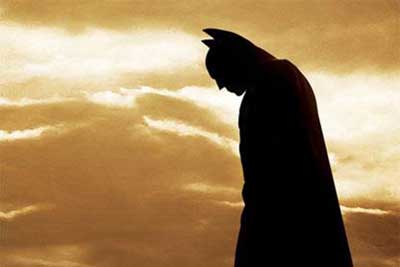身为父亲,对小孩的责任往往体现在细微处,面对一个日益纷繁复杂的社会,怎样保护孩子那颗幼小的心灵,确实是严肃而又重大的课题。
What 'Batman' Taught Me About Being a Good Dad
On the cartoon Batman: The Brave and the Bold (and in DC Comics), Bwana Beast is one of the Dark Knight's crime-fighting colleagues. He's a D-list superhero whose powers enable him to combine two animals into one: a mosquito gets crossed with a buffalo into a flying, stinging, ramming monster—that kind of thing. He wears a pointy mask and an animal-skin loincloth.
My son, five years old, watches this iteration of Batman religiously—we save stacks of them on the TiVo. Now, I've been careful—I watch every episode before he does. Truth is, I'd probably watch this cartoon even if I didn't have kids. It's a fun take, inflected by the wacky silver-age adventures of the 1950s and 1960s. But for example, I didn't let my son watch the episode where Batman tracks down the man who killed his parents. Because, you know: dead parents. I watched the Bwana Beast episode ahead of time, too. The plot doesn't really matter—it was a two-part alien invasion extravaganza, and in part two, Bwana Beast gets hooked to a mad-science machine that controls a Godzilla-sized monster made of millions of evil alien starfish. (These things happen.) While taking control of the starfish monster so the other heroes can destroy it, Bwana Beast exceeds the limits of his powers. He asks Batman to tell his fiancé, a hero named Vixen, that he loves her. And then he vanishes in a nimbus of energy.
Back on Earth, in a wordless montage, Batman goes to see Vixen. She collapses in tears. Later, in front of a giant statue of Bwana Beast, other costumed heroes walk past her, making comforting gestures. In a presumably posthumous voiceover, Bwana Beast says he would do it all again, in a hummingbird's heartbeat. I decided, roughly, that I wouldn't let the kid see it. Because, you know: dead superheroes. But idiotically, I had used the end of part one as an opportunity to explain what "to be continued" meant. And the little so-and-so remembered. A few nights later, he asked to watch part two, and after some hesitation, I decided to give it a shot. During the memorial sequence, my son figured out something was wrong. "Papa," he said, "why they all just standing there?"

"Bwana Beast was their friend," I said. "And now he's gone."
"What happened to him?"
"He used up all his powers fighting the starfish monster."
The boy climbed up onto the couch into my lap, facing me. "Can't he get more power?" he asked, voice cracking.
"There isn't any more power," I said. "He used it all."
He started to cry. "Is he coming back?"
I started to cry, too—for freaking Bwana Beast, a character about whom, frankly, I could not possibly care less. I ran through my options. I could tell the boy that, hey, in comic books, dead people always come back. It's a thing. Or I could remind him that it was just a story, that it wasn't real.
But that cynicism would undercut my secret plan. I am trying to build a good human being here, someone who will make the world better for his presence. Because I don't know any other way to do it, that means I'm building a little geek. So he can't know, yet, that death doesn't really mean anything in comics. I want him to think that these stories have weight, that they mean something; they are our myths. I give my son comics and cartoons and episodes of Thunderbirds because I want him to understand right and wrong, and why it's important to fight the dark side of the Force. The mantras spoken in this corner of pop culture are immature, but they have power: With great power comes great responsibility. Truth, justice, and the American Way. The weed of crime bears bitter fruit. No evil shall escape my sight.
On the other hand, I don't like it when he cries.
I said: "He's not coming back."
"But why isn't he coming back?" Lots of tears. My son is not particularly cuddly, but he was holding onto me, tight.
"He had to help them beat the starfish monster."
He cried for another minute or two, and then his kindergartener brain rebooted. He grabbed a tissue to wipe away his tears and blow his nose, and it was time to talk about what book to read before bed. He wanted the one about how people build skyscrapers. You never know what kids are going to remember, I guess. I have no idea what lesson the death of Bwana Beast taught him. Maybe something simple, like, "Don't watch Batman." But I hope it was something else. I hope he turns out to be a geek, but more than that, I want him to wish he was a superhero. No matter what he ends up as in real life, I want him to have a secret identity that always fights for justice. And I don't know any better way to imbue him with those powers and abilities than comic books.
I have plenty of insecurity about the quality of my parenting, but Bwana Beast did not die in vain. He reminded me, at least, that with great parenthood comes great responsibility.
相关阅读
一只特立独行的青蛙
给小朋友们的信(E.B.怀特)
坚持梦想的罗伯茨
小人物如何取得大成就?
(来源:《大西洋月刊》 编辑:Julie)